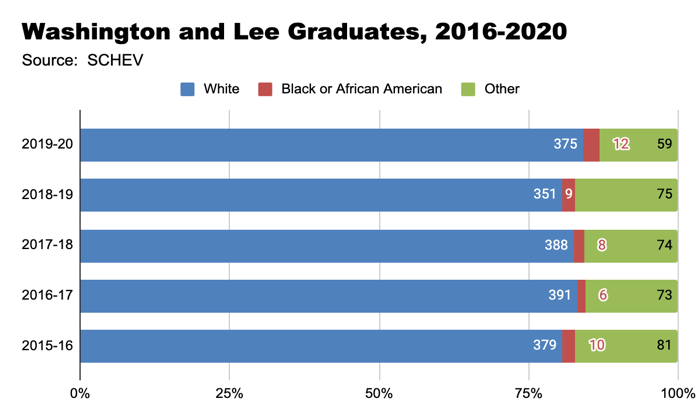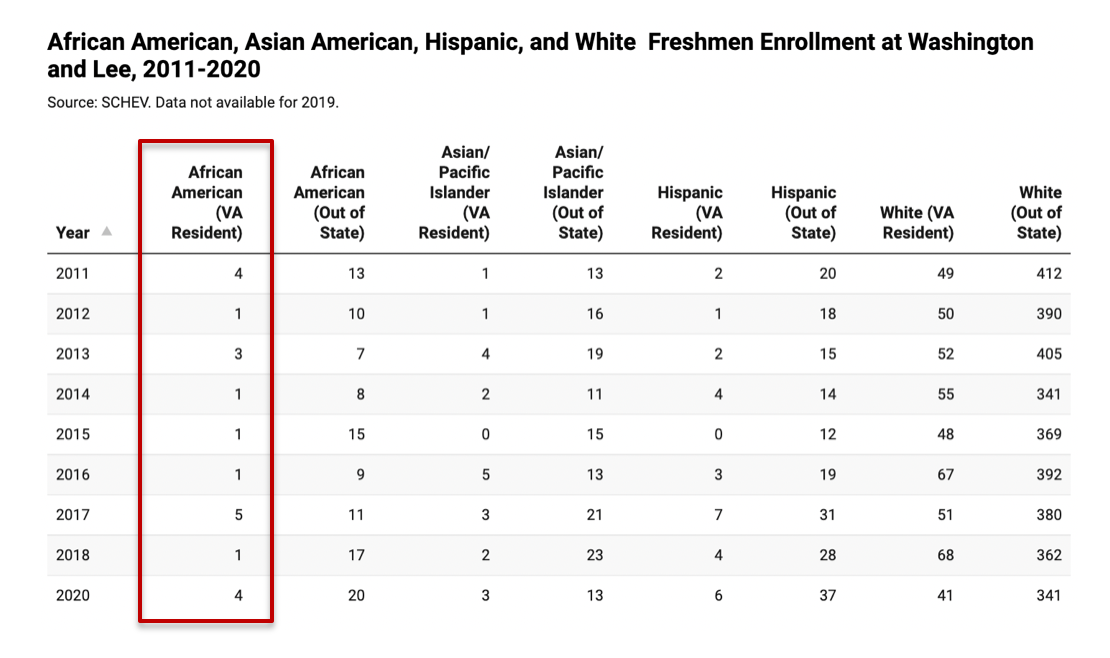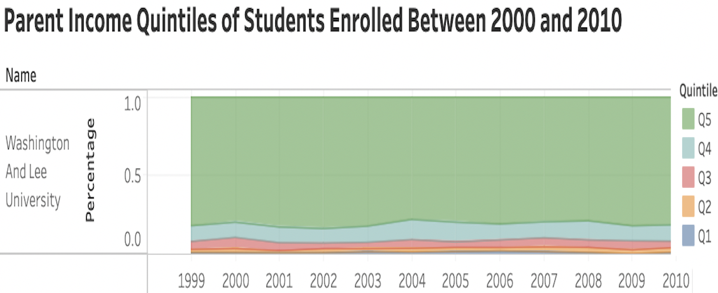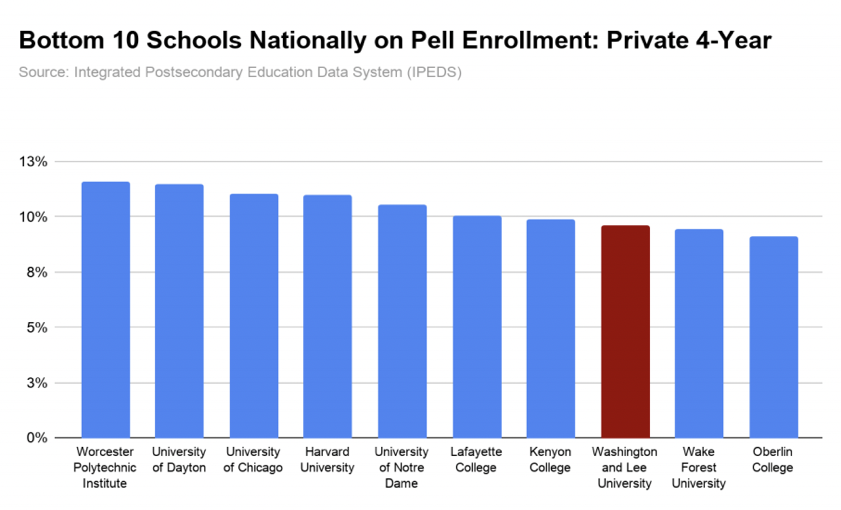By James Murphy
On March 23, several hundred students at Washington and Lee University in Virginia walked out of class to protest the Board of Trustees’ decision to delay deciding whether to drop Confederate General Robert E. Lee’s name from the institution, almost a year after a faculty vote to do so.
Tahri Phillips, Class of 2023, spoke at the gathering. She is a university ambassador of color, but she told the university newspaper she feels deeply conflicted about the role:
When a prospective student of color asks me ‘what made you choose to come to a school named after Lee?’ in my head I’m asking myself, how do I justify my choice to come to a school that glorifies a man who fought for the continued enslavement of my ancestors?
She said she ends up telling them that the academic, financial and professional opportunities outweighed the name.
“I’m disappointed with myself, because although I haven’t lied to them, it doesn’t feel like I’ve been truthful either,” Phillips said.
It was a brave and powerful confession. And it’s heart-breaking that a university would put a student in that position, where she feels guilty for sins that belong to the institution and its leadership.
Phillips is not lying. Washington and Lee is, by many accounts, an excellent university when it comes to academics. US News and World Report ranks it number nine in the nation for liberal arts colleges, although one wonders whether a university that honors white supremacy and fails to enroll a student body that looks even remotely like the American workforce its graduates will join should be evaluated on just academic merit.
Washington and Lee provides excellent financial assistance for students who enroll and may need support. The problem is that there just aren’t that many students who need financial assistance, because Washington and Lee enrolls so few students from working class and low-income families. Washington and Lee has the third lowest enrollment rate in the nation of Pell Grant-eligible students. Unbelievably, Washington Monthly ranked it number two for social mobility among all liberal arts colleges last year. (We’ve criticized the Monthly’s ranking and hopefully it will change going forward.)
Ms. Phillips, thankfully, is also not alone. In addition to the students who joined her in the protest last month, there is a growing coalition of students, faculty, and alumni pushing Washington and Lee University to repudiate not only its allegiance to historical white supremacy, but its frankly miserable commitment to diversity, equity, and inclusion in the present.
African-American students have made up just 2-3% of undergraduates at Washington and Lee for the past decade.
Over the past five years, on average, nine African-American students have graduated Washington and Lee each year. Nine: that’s small enough to count on two hands.

As our new report on de facto segregation in Virginia higher education highlights, that’s better than the number of African-American freshmen from Virginia that Washington and Lee has enrolled each year, of average. In that case, you need just one hand: it’s two. In five out of the last ten years, you needed one finger. There were 19,362 African American students who graduated from Virginia’s public schools in 2018, and Washington and Lee enrolled just one. That’s right, one. Between 2011 and 2018, 150,705 African-American students graduated from Virginia’s public schools, and Washington and Lee just enrolled 17, or 0.01%, of them altogether.

Washington and Lee doesn’t do much better when it comes to low-income students. A 2017 piece in the New York Times showed that Washington and Lee had the third largest gap in the country between the share of its class from the top one percent in income (19.1%) and the bottom 60% (8.4%). Between 2000 and 2010, Opportunity Insights found, 80% of Washington and Lee students came from the top 20% in terms of income.

Source: Opportunity Insights
As we discuss in our new issue brief, Scratching the Surface, Washington and Lee ranks in among bottom five of all colleges nationally when it comes to enrolling students with Pell Grants, despite having an endowment worth $1.6 billion.

The most generous way we might be able to explain the dismal state of affairs at Washington and Lee is that they are terrible at recruiting students in Virginia and across the country. Out of 130 counties and cities in Virginia, there are 60 that did not send a single student to the university between 2015 and 2019, according to state data. At the other end of the spectrum, there are 10 counties and cities that account for 4% of Virginia’s population,12% of Washington and Lee’s applications, and…wait for it…24% of its enrollments. Perhaps the admissions department needs to look farther and wider than it has to enroll a class that looks more like Virginia and America. Unless, that is, Washington and Lee looks exactly the way its leadership wants it to look.
A coalition of students, faculty, and alumni called Not Unmindful has presented Washington and Lee’s Board of Trustees with a list of demands, including implementing a plan to increase equity, diversity, and inclusion; addressing long-standing problems of exclusion on campus; removing Robert E. Lee’s name from the school; and diversifying the very Board that has stood in the way of change. According to Not Unmindful, the university’s Board of Trustees has 28 members: 20 white men, 5 white women, and 3 men of color. In its entire history, there have been 4 Black trustees, all men. Washington and Lee only started admitting women in 1985, and during that period only 20 out of 134 trustees appointed have been women.
Washington and Lee is a non-profit private university, but it receives millions of dollars in state aid from Virginia’s Tuition Assistance Grant program every year, which provides over $3,000 to residents attending private four-year colleges. The University is receiving over $5 million in emergency coronavirus relief aid. It receives tens of millions each year in federally subsidized student loan dollars. And let’s not forget its non-profit tax status, worth hundreds of millions, if not billions, over its many years of existence.
Sens. Chris Coons (D-DE) and Jacky Rosen (D-NV) have proposed to hold super-wealthy public and non-profit colleges like Washington and Lee accountable. Where are Virginia’s lawmakers? It is not just reasonable but justified for federal and state policymakers to insist Washington and Lee make a meaningful commitment to diversity, if only to save itself from being on the wrong side of history.
# # #